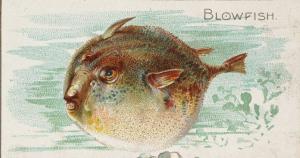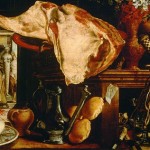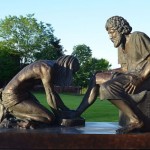 1 Corinthians 8
1 Corinthians 8
“Knowledge puffs up but love edifies” (verse 1.) This is Paul’s main message for today, and the example of the weaker brother is an illustration of this principle.
“Knowledge puffs up but love edifies.” The Greeks had a problem with putting too much confidence in human knowledge, and so one of Paul’s major themes to the Corinthians is to not be proud on account of the human knowledge but to be concerned about the holy things of God. The Greeks idolized knowledge, and Aristotle seemed to think that a life of philosophy and gaining knowledge was the chief end of man.
The Greeks believed that “To know the good is to do the good,” meaning that if you know what is right, you will do it. Such a philosophy shows little understanding of sin or man’s bondage to it. In some ways the “Renaissance,” followed especially by the “Enlightenment,” was a turn back toward the philosophy of the Greeks. While not denying the good things that may have providentially come from these movements, they were at heart turns towards man and his knowledge.
These beliefs are still embedded in our culture, along with Christian beliefs. Though two World Wars and the bloodiest century in the history of mankind have produced a postmodern reaction to such an exalted view of man’s knowledge, the belief is still with us. If it didn’t have such devastating consequences, our ignorant views of sex education are a case in point. We assume that if you just educate kids about how to have safe sex and to avoid the dangers of unsafe sex, then they’ll be O.K. Not only does this reveal an ignorance of the human heart (it echoes the belief that if only kids knew what was right they would do it) but such a statement is blind to its own assumptions that sex outside marriage is good for people and society and capable of being rendered safe by man and his knowledge.
As Christians, our fundamental beliefs are radically different than the Greeks or their heirs. Our belief may be stated not as “To know the good is to do the good” but “To know God is to love like God.” At the heart of Christianity is the love of God, and not the knowledge of man. While the Corinthians, Greeks, and moderns focus on man and self, Christians are focused, in love, on God and others.
In fact, true knowledge comes through love because it unites us to God, who in love gives Himself to us through knowledge (intimate, spiritual knowledge) of Jesus Christ. For St. Paul, here is how knowledge and love relate: “If anyone loves God, this one is known by Him” (verse 3.) Likewise, to know God is not to know simply about Him, something that an Enlightenment Christianity has believed and that many of us are heirs to, but involves loving Him and obeying Him and participating in His life through the life of His Son. Theologically speaking, we are experiential learners, and not just cognitive ones.
Paul’s example of the stronger and weaker brothers, then, is an illustration of love in action. “Therefore, if food makes my brother stumble, I will never again eat meat, lest I make my brother stumble” (verse 13.) Notice how the emphasis is not on what the stronger brother knows about the fact that idols are nothing but is instead on how he does or does not show love toward his weaker brother. Giving up what I have a legitimate right to – food sacrificed to idols – for the sake of another is an act of love.
Though not many of us have problems with food sacrificed to idols, there are still stronger and weaker brothers with us. For example, there are a lot of alcoholics who are Christians. And then there are those of us who like our scotch or Guinness Stout. What are we to do? If there is any chance that my imbibing would cause a brother or sister to stumble, then I can make do without the beverage of my choice for a little while.
Or think of the child who knows things that another child does not or can do things that another child cannot. The more gifted child’s bragging can easily hurt someone less gifted. The great irony is that what the child is boasting about is all a gift of God anyway, and yet he’s claiming the credit and in the process hurts one created in the image of God.
I’m sure you can think of even better examples. St. Augustine extended the meaning to those who are weak not because of ignorance but because of moral failings, saying that: “If you love the weak person less because of the moral failing that makes him weak, consider the One who died on his behalf.” And again, St. Augustine says: “It is the very law of Christ that we bear one another’s burdens. Moreover, by loving Christ we easily bear the weaknesses of another, even him whom we do not yet love for the sake of his own good qualities, for we realize that the one whom we love is someone for whom the Lord has died.”
In all of our relationships with other Christians, remember always that “knowledge puffs up but love edifies.” This is the law by which Jesus Christ lived, and it’s a good thing. If He judged me or any of you based on our knowledge or goodness . . . . Well, you know where I’m going with this.
Therefore, love. Be ready to give up yourself for others, as Christ gave up Himself for you. For it is in loving that we truly know God, and it is in loving that we are most made like Him.
Prayer: Father, I thank You for the love with which You first loved me, even when I was ignorant and blind and sinful. Help me to know You better by being more loving to those You have put in my life. By Your grace, enable me to seek the good of others above my own. Amen.
Point for Meditation: Meditate on what it might mean to be a weaker brother. If you were a weaker brother, how would you like your stronger brothers and sisters in Christ to treat you?
Resolution: I resolve to consider one relationship where I may not be acting in love. I resolve further to find a practical way to remedy my lack of love in this situation.
Blowfish – Creative Commons CC0 1.0 Universal Public Domain Dedication











